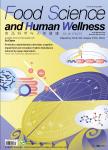The protective effects of procyanidin C-1 on bisphenol A-induced testicular dysfunction in aged mice
The protective effects of procyanidin C-1 on bisphenol A-induced testicular dysfunction in aged mice作者机构:Maternofetal and Embryo Research Group(MatE)Faculty of MedicineUniversiti Teknologi MARASelangor BranchSungai Buloh Campus47000 Sungai BulohSelangorMalaysia Faculty of Health SciencesUniversiti Teknologi MARASelangor BranchPuncak Alam Campus42300 Puncak AlamSelangorMalaysia
出 版 物:《Food Science and Human Wellness》 (食品科学与人类健康(英文))
年 卷 期:2022年第11卷第4期
页 面:965-974页
核心收录:
学科分类:0832[工学-食品科学与工程(可授工学、农学学位)] 1004[医学-公共卫生与预防医学(可授医学、理学学位)] 08[工学] 083201[工学-食品科学]
基 金:supported financially by Universiti Teknologi MARA grants (600-IRMI/DANA KCM 5/3/LESTARI – 224/2017), (600-IRMI/My RA 5/3/GIP-030/2017) Ministry of Higher Education (MOHE) grant (600-IRMI/RAGS 5/3 - 72/2015)
主 题:Apoptosis Bisphenol A Procyanidin Mitochondrial dynamics Testis
摘 要:The number and quality of sperm are decreased due to bisphenol A(BPA) exposure, an endocrine-disrupting chemical on the male reproductive system, especially in advanced paternal age(APA). Procyanidin C-1(PCY-1), an antioxidant from grape seed(Vitis vinifera L.), has demonstrated anti-viral, anti-melanogenic and immunostimulatory effects. Therefore, this study aims to determine the effects of PCY-1 intervention on sperm parameters, testis morphological changes, serum testosterone, oestradiol, and luteinizing hormone(LH) concentrations and the expression of apoptotic(Bax and Bcl-2) and mitochondria-related(Mfn1 and Opa1) genes in BPA-exposed aged mice. Results revealed that PCY-1 intervention improves aged male fertility in BPA-exposed conditions by decreasing abnormal sperms percentage and increasing spermatogenic cell diameter and epithelial height. PCY-1 also decreased oestradiol, and increased LH and testosterone levels. The gene expression of Bax was significantly down-regulated by PCY-1 intervention. In contrast, Bcl-2 was substantially up-regulated. Expression of Mfn1 and Opa1 genes were also significantly up-regulated in the PCY intervention group. Hence, it is demonstrated that PCY-1 was able to mitigate the adverse effects of BPA on reproductive parameters of aged mice. Collectively, we postulated that PCY-1 has a potential role in protecting the ageing male reproductive system against the damaging impacts of BPA.



